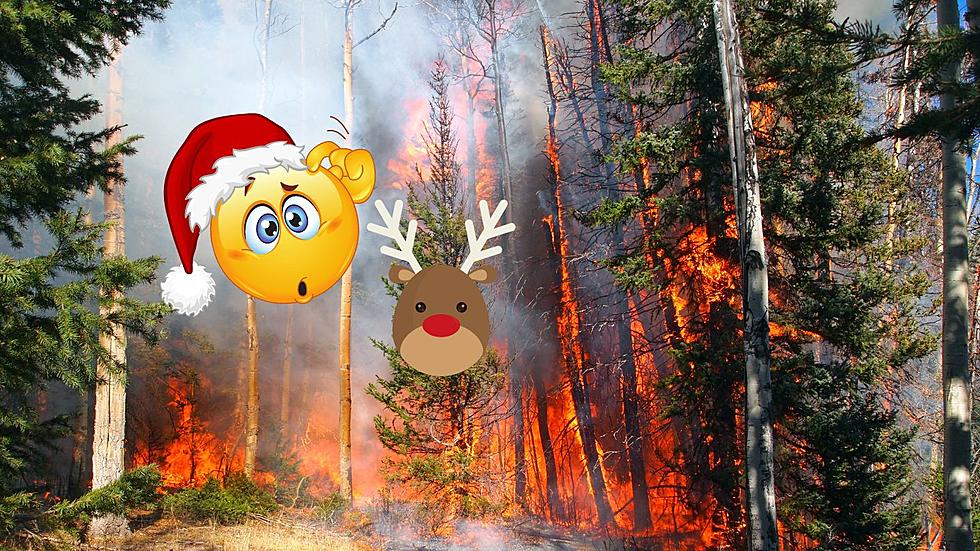
Minnesota DNR Issues Rare December Wildfire Warning
This is the type of warning you expect to get in Minnesota in mid-December, but this has not been a typical winter with warmer temps and a lack of snow and those conditions don't appear to be changing anytime soon.
This week, the Minnesota Department of Natural Resources issued an advisory warning Minnesotans that the threat of wildfires exists throughout the state.
According to the DNR, the lack of snow and unusually warm, dry conditions over the next week are likely to increase fire danger in much of Minnesota. Dry, brown grasses and vegetation mean wildfires can start easily and spread quickly. They add that this elevated risk is likely to persist until we have continuous snow cover.
Adding to the threat are the drought conditions Minnesota has experienced over the past few years. Now, any new fires have the potential to burn deep into the unusually dry organic soil layer. The DNR says that deep-burning fires hold heat for days, sometimes months, and could lead to wildfires in the days or weeks ahead.
“Don’t be fooled because it’s December. Even with some scattered snow showers, burning vegetative debris is risky right now, especially with temperature increases and windy conditions predicted over the next week,” said Karen Harrison, DNR wildfire prevention specialist. “We are asking people to consider delaying any planned burning until conditions improve.”

To be safe, the DNR recommends waiting to burn brush or vegetative debris until there is at least 3 inches of snow cover on the ground. Alternatively, Minnesotans are asked to consider composting, chipping, or transporting materials to a brush collection site as alternatives to burning.
It's important to note that when conditions improve, burning permits are required for burning vegetative debris (leaves, branches, woody material, etc.) in piles larger than 3 feet high by 3 feet in diameter until there are at least 3 inches of continuous snow cover.
The DNR's fire danger and burning restrictions webpage is a terrific resource as both maps update every 5 minutes.
When will the Twin Ports area have 3 inches of now, or will it even start to look and feel like a typical December? According to our media partners at WDIO-TV, not anytime soon.
Here's the forecast for the weekend and through December 20 for the area:
- Thursday: Sunny, breezy, and warm. High 46. WSW wind 10-20 mph.
- Thursday night: Becoming overcast with a chance for rain after 3 am. Breezy. Low 33. WSW wind 10-15 mph. Chance of rain: 60%
- Friday: Cloudy with rain that mixes with snow in the afternoon. High 38. W wind shifting to E 5-10 mph. Chance of precip: 90%
- Friday night: Cloudy and breezy with rain and snow becoming all snow late. Low 30. E wind 10-15 mph. Chance of precip: 80%. Snowfall is around one inch.
- Saturday: Lingering snow in the morning, then remaining cloudy and breezy. High 36. E wind shifting to S 10-15 mph. Chance of snow: 50%.
- Sunday: Mostly cloudy. High 36. WNW wind 5-15 mph.
- Monday: Sunny. High 30. NW wind 5-15 mph.
- Tuesday: Partly cloudy. High 34. S wind 5-15 mph.
- Wednesday: Partly cloudy. High 34. E wind 5-10 mph.
Once conditions do make it safe to do so, dry leaves, plant clippings, brush, and clean untreated-unpainted wood can be burned. No household trash, garbage, or treated lumber can be burned outdoors at residences.
The DNR offers the following tips when burning landscape debris:
- Landscape debris piles must be small and manageable.
- Clear all flammable material and vegetation within 10 feet of the pile's outer edge.
- Only burn when weather conditions are safe. Do not burn if it is windy or dry.
- Keep a water supply and shovel close to the burning site.
- A responsible adult is required by law to be in attendance until the fire is completely out.
- Once your burn is completed, be sure to "mop up" the ashes with water and stir. Wildfires are often started from "holdover" debris piles that were not properly extinguished. This can occur days or even weeks after they were burned. Failure to extinguish a fire can also be a misdemeanor offense and have a maximum penalty of up to 90 days in jail, a $1,000 fine, or both. Suppression costs can range from $150 to millions of dollars.
LOOK: 50 cozy towns to visit this winter
Gallery Credit: Laura Ratliff

LOOK: This is where homes are selling the fastest right now
Gallery Credit: Stacker
